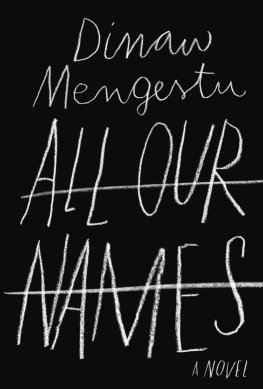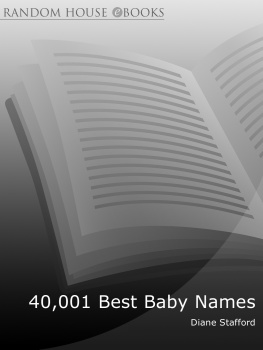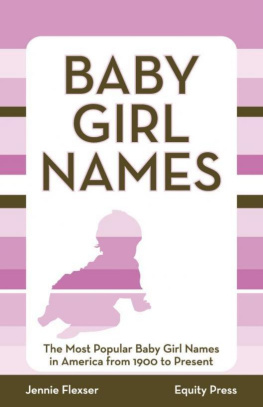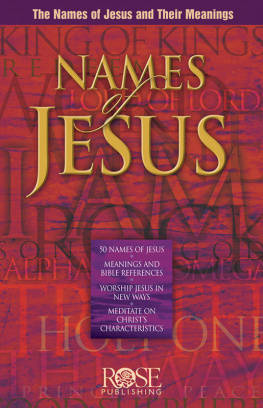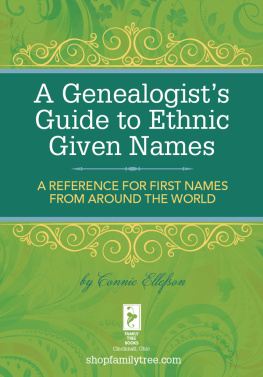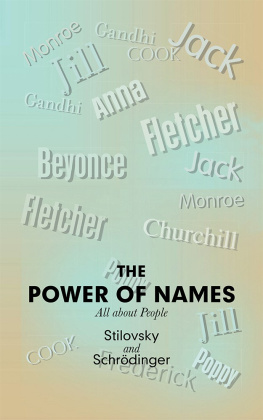Dinaw Mengestu
All Our Names
To Anne-Emmanuelle,
Gabriel, and Louis-Selassie
When Isaac and I first met at the university, we both pretended that the campus and the streets of the capital were as familiar to us as the dirt paths of the rural villages we had grown up and lived in until only a few months earlier, even though neither of us had ever been to a city before and had no idea what it meant to live in such close proximity to so many people whose faces, much less names, we would never know. The capital in those days was booming, with people, money, new cars, and newer buildings, most of which had been thrown up quickly after independence, in a rush fueled by ecstatic promises of a socialist, Pan-African dream that, almost ten years later, was still supposedly just around the corner, that, according to the president and the radio, was coming any day now. By the time Isaac and I arrived in the capital, many of the buildings had already begun to show signs of wear, having been neglected or completely forgotten, but there was still hope in the brighter future to come, and we were there like everyone else to claim our share.
On the bus ride to the capital, I gave up all the names my parents had given me. I was almost twenty-five but, by any measure, much younger. I shed those names just as our bus crossed the border into Uganda. We were closing in on Lake Victoria; I knew Kampala was close, but even then I had already committed myself to thinking of it only as the capital. Kampala was too small for what I imagined. That city belonged to Uganda, but the capital, as long as it was nameless, had no such allegiances. Like me, it belonged to no one, and anyone could claim it.
I spent my first few weeks in the capital trying to imitate the gangs of boys that lingered around the university and the cafs and bars that bordered it. Back then, all the boys our age wanted to be revolutionaries. On campus, and in the poor quarters where Isaac and I lived, there were dozens of Lumumbas, Marleys, Malcolms, Csaires, Kenyattas, Senghors, and Selassies, boys who woke up every morning and donned the black hats and olive-green costumes of their heroes. I couldnt match them, so I let the few strands of hair on my chin grow long. I bought a used pair of green pants that I wore daily, even after the knees had split open. I tried to think of myself as a revolutionary in the making, though I had come to the capital with other ambitions. A decade earlier, there had been an important gathering of African writers and scholars at the university. I read about it in a week-old newspaper that had finally made its way to our village. That conference gave shape to my adolescent ambitions, which until then consisted solely of leaving. I knew afterward where to go and what I wanted to be: a famous writer, surrounded by like-minded men in the heart of what had to be the continents greatest city.
I arrived in the capital poorly prepared. I had read the same Victorian novels a dozen times, and I assumed that was how proper English was spoken. I said sir constantly. No one I met believed I was a revolutionary, and I didnt have the heart to claim I wanted to be a writer. Until I met Isaac, I hadnt made a single friend. With my long skinny legs and narrow face, he said I looked more like a professor than a fighter, and in the beginning that was what he called me: Professor, or the Professor, the first but not the last name he christened me.
And what about you? I asked him. I assumed that, like others, he had another, more public name that he wanted to be known by. He was shorter but wider than me, each of his arms tightly laced with muscles and veins that ran like scars the length of his forearms. He had the build but not the face and demeanor of a soldier. He smiled and laughed too often for me to imagine he could ever hurt someone.
For now, Isaac is it, he said.
Isaac was the name his parents had given him and, until it was necessary for us to flee the capital, the only name he wanted. His parents had died, in the last round of fighting that came just before independence. Isaac was their legacy to him, and when his revolutionary dreams came to an end, and he had to choose between leaving and staying, that name became his last and most precious gift to me.
From the beginning, it was harder for Isaac than for me to be in the capital. This had never been and, I understood later, would never be my home, regardless of what I imagined. It was different for Isaac, however. Uganda was his country, and Kampala was the heart of it. His family was from the north, one of the tall, darker tribes that a man in Cambridge had decided were more warrior-like than their smaller cousins to the south. Had the British stayed, he would have done well. He had been bright enough in his early years to be talked of as one of the students who when older could be sent abroad, perhaps to a public school in London on a government scholarship. But then the whole colonial experiment ended in what seemed like a single long bloody afternoon, and boys like Isaac were orphaned a second time. And although Isaac had arrived in the capital only a few weeks before me, he knew enough about it from rumors and stories to assume he would easily find his place in it, and then rise to the top of whatever circle he found himself in. The fact that he was poor and completely unknown when we met was his most obvious well of frustration, but I suspected there were other sources of anger and heartbreak that he had yet to acknowledge.
Isaac and I became friends the way two stray dogs find themselves linked by treading the same path every day in search of food and companionship. We had taken up residence in the eastern quarters of the city, in the harder-to-reach, hill-rich region prone to mudslides. He was living with friends of cousins, who had agreed to house him on the floor in their living room. I was renting a cot in the back of a dry-goods store that on the weekends became an impromptu bar for the owner and his friends. On Friday and Saturday nights, I wasnt allowed to return to the store until 2 or 3 a.m., after the bed had been used by the owner and his friends to entertain themselves with some of the young girls in the neighborhood. With no money and nothing else to do, I would circle the neighborhood a maze of rutted, narrow paths that wound slowly up the side of a hill, at the top of which was one of the citys newly paved roads. From here, one could look down upon our shanty village as it descended into what had been a lush, green valley, rich for grazing cattle but had become, with the mass migration to the capital, a dense cluster of tin roofs and wires, ringed by shallow pits of trash and feces. Twice I saw Isaac up there before we ever spoke to each other. On both occasions he was standing on the side of the road, staring at the passing traffic instead of the city beneath him, as if he were preparing to sacrifice himself to one of the cars at any moment. We acknowledged each other with a quick nod of the head. Neither of us could have done more without alarming the other; had I not seen Isaac at the university shortly afterward, we might have spent years nodding to each other from the edge of the road. A few days after that second meeting, however, I saw him on campus. We were trying our best to belong, standing near but never too close to a group of students. It was the second week of August, and with the start of a new year there were students gathered on every square inch of the central lawn, which was ringed by towering palm trees that gave the campus an air of tropical grandeur far greater than it deserved. When I saw him, I knew he was at the university not because he was supposed to be, but because, like me, he felt that was where he belonged, among the bright, future generation. Like me, he had told everyone he knew and met that he was a student, and at that time both of us were convinced that someday we would be.

